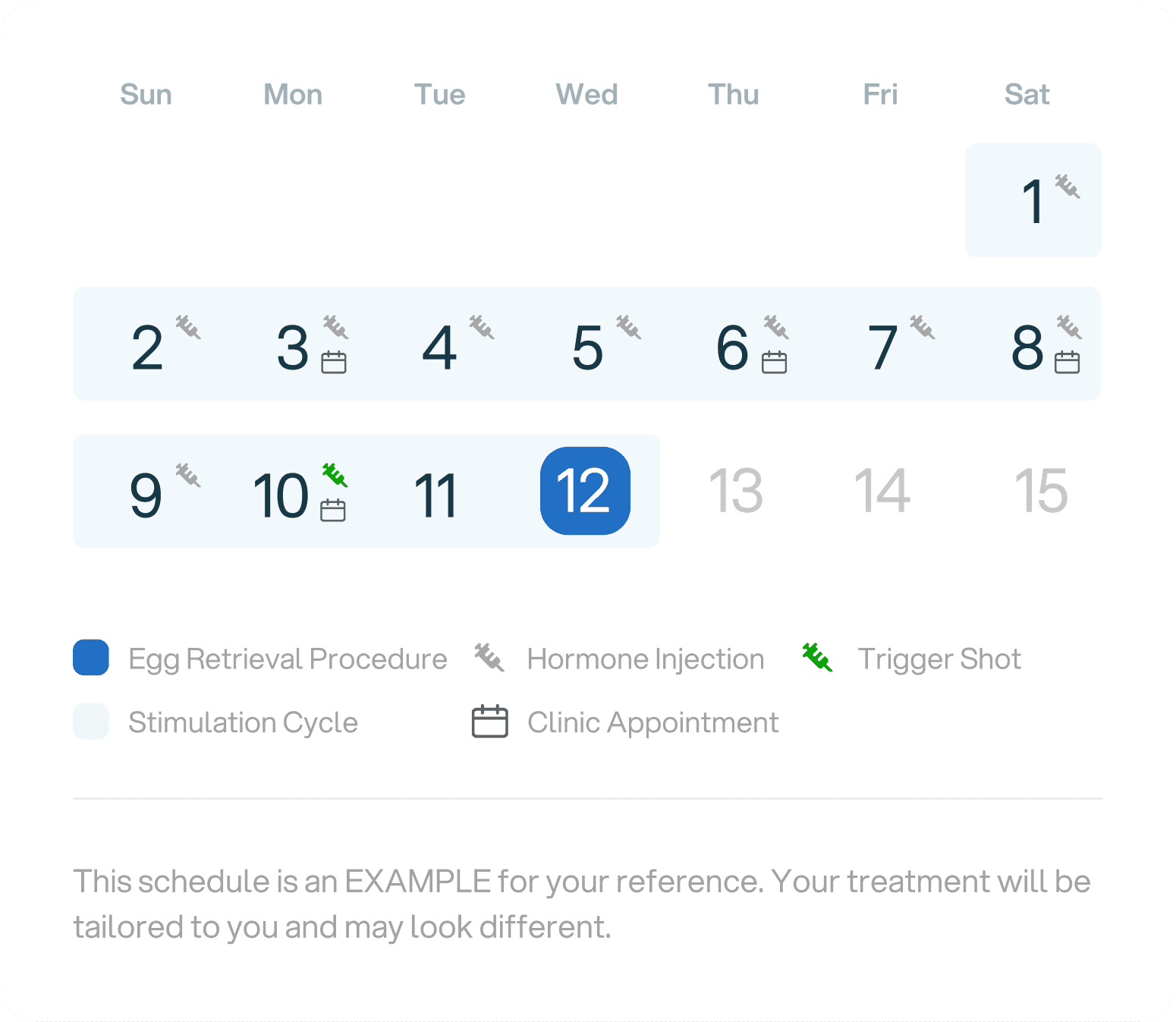January 2, 2025
What to Expect During Egg Freezing: Process and Timeline Explained
We break down the egg-freezing process, from preparation to recovery.

Maggie Jones
Registered Nurse
5 Minute Read
The egg-freezing process is a focal step of your fertility journey. You've already been through your initial fertility testing and a consultation with your doctor to discuss a plan, and you are ready to move forward on your egg freezing journey.
To help you navigate this crucial moment in your life, it helps to get a better grasp of the egg-freezing process timeline. Whatever your purpose is for undergoing the procedure, understanding the process allows you to approach it with much-needed confidence.
Let's break down what to expect in an egg-freezing process, step by step.
Egg Freezing Process: A Step-by-Step Timeline
The egg retrieval (or oocyte retrieval) procedure is a minimally invasive and quick outpatient procedure that has several key phases, each meant to maximize your chances of preserving healthy eggs.
To clarify what lies ahead for you, the following is an overview of an egg-freezing process timeline.

Before the Egg Retrieval
The retrieval procedure lasts about 10-30 minutes, but the preparation that comes before takes place in a span of about two weeks — this is how long the entire egg-freezing process usually takes.
The first 10-14 days involve self-administered injections of hormones that stimulate the ovaries and help them produce multiple eggs instead of just one, which is typical of a natural cycle. An antagonist medication will also be given to prevent premature ovulation so your eggs can be retrieved at the appropriate time.
During this phase, you'll need to visit a local monitoring clinic every 2-4 days for ultrasounds and blood tests. Your local monitoring clinic will work with your fertility doctor by providing them with the results of your ultrasound and blood tests. Through these check-ups, your doctor will monitor your follicle growth and hormone levels to see how well your ovaries are responding to the medications. They will also be able to determine the optimal time for egg retrieval at this stage.
You might experience bloating, mild cramping, or mood swings due to hormonal changes, which are normal side effects to anticipate. You will want to stay close to home and avoid unnecessary travel during these two weeks. You will be able to continue working, as long as it does not include vigorous exercise, up until your retrieval.
Roughly 36 hours before the actual process of retrieving and freezing your eggs, a final injection will be given to trigger your eggs to mature and release from the follicles at the direction of your fertility team.
After the Egg Retrieval
After the egg retrieval, your healthcare provider will schedule follow-up appointments to discuss how many eggs were retrieved and their quality, which can help guide your next steps in the fertility process.
Based on the results, you and your doctor will discuss the options available to you apart from egg freezing, such as fertilization and embryo transfer or additional cycles.
With proper cryopreservation, frozen eggs can remain viable for 10+ years. If fertilization is planned, you'll receive updates over the next several days as embryos develop.
As for your immediate recovery within the egg freezing process timeline, while you may feel ready to return to normal activities right away, it's advisable to rest for the remainder of the day. Most patients can return to work the day after your procedure, but try to observe the following recovery tips as best as you can:
Drink plenty of fluids and consume easily digestible foods like soups and fruits.
Take short walks to encourage blood circulation.
Avoid drinking alcohol, smoking, and engaging in heavy lifting or exercise.
Do not ignore severe symptoms, such as heavy bleeding or intense pain. If these do happen, contact your doctor immediately.
There are common side effects you can look out for, such as mood swings, bloating, abdominal discomfort, or spotting. However, remember that everyone's recovery experience is different. If you feel unwell or have severe pain, don't hesitate to reach out to your healthcare provider.
It's also normal to feel a mix of emotions after the procedure. Whether it's excitement, anxiety, or even disappointment, seeking support from friends, family, or a counselor can be helpful.
Plan What’s Next for You with Elsa Fertility
The process of egg freezing and retrieval opens up your fertility journey to broader opportunities. It may feel like an overwhelming procedure to go through, but it’s also a hopeful milestone that brings you much closer to your goals.
By understanding the process and taking care of your physical and emotional well-being, you can prepare yourself both physically and emotionally for this important moment in your journey toward parenthood.
If your next step is fertilization, embryo transfer, or freezing eggs for the future, Elsa Fertility is here to guide you in every step of the way.
Learn more about egg freezing by scheduling a consultation with Elsa Fertility today.
© 2024 Elsa Fertility. All rights reserved.





